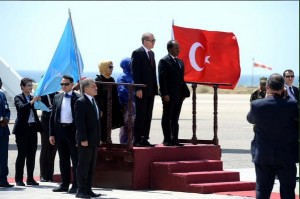BY HASAN KANBOLAT
Turkey is keeping its promises in Somalia. President Recep Tayyip Erdoğan, through his visit as prime minister to Somalia on Aug. 19, 2011, restarted the process of Somalia’s return to life. Erdoğan was the first non-African leader to visit Mogadishu in two decades. On Jan. 25, 2015, he held a one-day visit to this country to see the progress in investments and the improvements in bilateral relations between the two countries. Turkey is part of the historical change in Somalia. In 2011, a move was made from the prevention of hunger to infrastructure investments and a restructuring of the state.
Turkey’s Somalia policy is no longer dependent on Erdoğan. It has become a state policy supported by the people. The Justice and Development Party (AK Party), the Republican People’s Party (CHP) and the Nationalist Movement Party (MHP) jointly endorsed a parliamentary bill allowing the Turkish Armed Forces (TSK) to deploy troops and other military elements off the coast of Somalia and the surrounding areas for another year, starting from Feb. 10, 2015. The Peoples’ Democratic Party (HDP) did not support the motion, which had been extended five times before.
Turkish foreign policy, which has been criticized for its failure since the 2011 Syrian civil war, has become successful in Somalia thanks to the practice of “sister countries.” Through this practice, Turkey identified Somalia as a sister country, after the Turkish Republic of Northern Cyprus (KKTC). The policy is so successful that the Somali people, who do not like the presence of foreigners and foreign forces in their lands, have embraced Turkey. Bonds of friendship and brotherhood have been established between the two peoples.
This practice of establishing sister countries suggests that a politically and economically powerful state pays attention to the needs of a weaker state without considering its interests and makes efforts for its development through coordination among civil society institutions. It is only useful for Turkey to introduce this practice to other countries in the 21st century when income inequality has become a grave problem for the sake of global peace and welfare. The practice of sister countries is a hand extended by the rich to the poor. It is a contribution to development. At the same time, it is also an antidote to the jihadist-Salafi ideology which is spreading like a cancer in the Muslim world.
China is implementing a similar development model with great success. In order to ensure economic development in the Xinjiang Uyghur Autonomous Region, which is home to 20 million people, four richer provinces in southern China have been organized so that they extend help to this region. The four provinces transfer financial resources, technology and industrial production tools to Xinjiang. As a result, major cities of the autonomous areas have turned into huge construction sites.
Somalia poses serious security risks. Turks are not intimidated by high risk. And they do not turn away from the Somali people even if it sometimes means that its officials are murdered. In the meantime, I salute the memories of police officers Sinan Yılmaz, Sadettin Doğan and Uğur Tezcan, who were assassinated on July 27, 2013, in Somalia.
source: Today’s Zaman



Leave a Reply